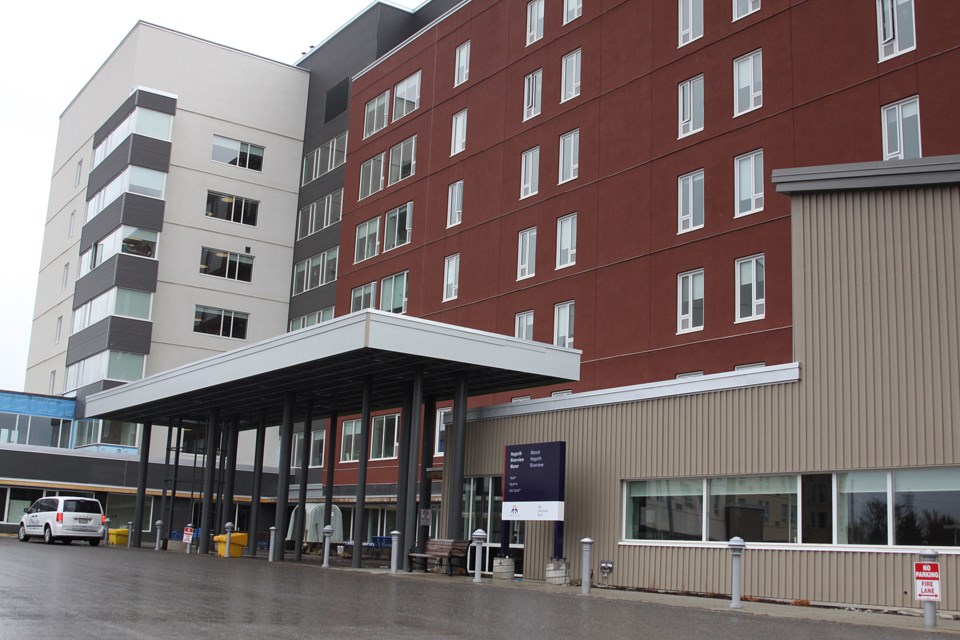THUNDER BAY - A resident at Hogarth Riverview Manor is concerned a perceived lack of frontline personal support workers and the upcoming addition of home care workers could negatively impact both residents and staff at the long-term care home.
“I used to be a nurse,” said Diane Moorhouse, a resident at Hogarth Riverview Manor. “I’ve had MS for a number of years and I’ve been in long-term care for about nine years. I understand a lot of the logistics of how the whole system works. That’s why I’m also speaking out that I’m not happy with the decrease of the amount of care people are getting.”
Moorhouse said from a residence’s perspective, there appears to be a reduced number of PSWs providing care to the 32 residents, which became noticeable in April when she said the usual four PSWs was reduced to three during the day shift.
Hogarth is administered by St. Joseph’s Care Group and CEO, Tracy Buckler, said there has not been any changes to the staffing model at the home, but the organization continues to struggle with shortages of PSWs.
“Our staffing model is three and a half PSWs on a day shift, which would equate to seeing four people there,” Buckler said. “There is a half-shift that seems to work to be able to assist with the bulk of the resident care for certain times of day.”
But those shifts are not always filled, which would result in a shortage of PSWs on a given day.
“There are times when we are not able to cover that fourth position,” Buckler said. “So there are times when there are resident home areas that would work short, but we would endeavor every day and every shift to work to our full staffing compliment.”
Buckler did not know exactly how often shift shortages may occur, but did say that replacing shortages can be a challenge because the PSWs do work very hard and sometimes are not able to come in to work.
In order to alleviate these shift shortages, St. Joseph’s Care Group is piloting a resident home worker program.
“This would be for those times when we can’t get the right number of personal support workers we planned for,” Buckler said. “Then we would be able to provide a different level of staffing in the resident home workers to be able to support the staffing plan as it is laid out.”
Resident home workers will not provide any personal care to residents, but rather assist with bringing residents to the dining hall, making beds, and doing laundry, tasks currently being done by PSWs.
There is no specialized training required to become a resident home worker and the position only requires a Grade 12 education and a commitment to working with the elderly.
But Moorhouse believes these new positions, whose role has been communicated to residents and family members, is not going to alleviate the shortages of PSWs that already exists.
“It’s someone that is just going to be trained off the street to transport people and make beds and help out the PSWs,” she said. “I’m not sure these new health care workers will alleviate what is going on.”
Moorhouse added that PSWs are responsible for assisting 32 residents in the morning and getting them ready for breakfast, which sometimes requires two PSWs in a single room at a time. When there is a shortage in the shift, that process takes that much longer.
“It’s causing them a lot of stress and the residents a lot of stress too,” she said.
Buckler said Hogarth Riverview Manor has been struggling with a shortage of PSWs for a long time, and there 64 beds at the facility that are yet to be occupied because of that shortage.
St. Joseph’s Care Group continues to work with Confederation College and its personal support worker program, but Buckler said with college faculty strike late last year delaying graduation or even seeing some students drop out, the shortage of PSWs will not disappear overnight.
“We are still quite short,” she said. “We are looking at every possible avenue.”
The resident home worker pilot is expected to begin in the next four to six weeks. Moorhouse added that the frontline staff is the backbone of the home and she said she would like to see more done to make their work load more adequate.
“The whole culture has to change that we respect the PSWs for what they are doing and give them adequate staffing to make their workplace an enjoyable place to be and that is just not happening now,” she said. “We’re not asking for extra special care. We just want to be looked after to a certain standard that we’ve been used to.”
